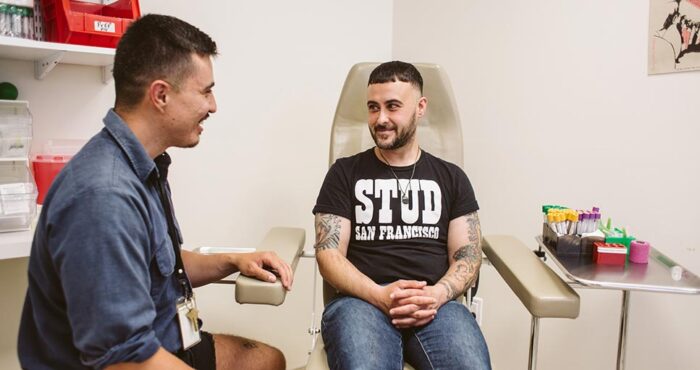“Tremendously exciting” news of cabotegravir long-acting injectable for PrEP shared at AIDS 2020

Final results from the HPTN 083 study of long-acting injectable cabotegravir for pre-exposure prophylaxis (PrEP) were shared at the AIDS 2020 conference this week. For men who have sex with men and transgender women, the cabotegravir injection provided highly effective HIV prevention when given once every two months.
“To have another option for people who are challenged by pill taking, who find it stigmatizing to take pills, who forget to take pills due to other priorities or limited access to contexts in which they can take pills, is tremendously exciting,” said Raphael Landovitz, from University of California, Los Angeles at an AIDS 2020 press conference. “To have an additional option that is highly effective and doesn’t require a daily activity for efficacy is really exciting progress that the study represents.”
The HPTN 083 study planned to enroll 5,000 men who have sex with men and transgender women; a total of 4,490 HIV-negative individuals were included in the final primary efficacy results (12.4% were trans women). Individuals were randomly assigned to receive either long-acting cabotegravir (an integrase inhibitor) injections, delivered every two months for approximately three years, or daily oral TDF/FTC (Truvada), an FDA-approved medication for PrEP.
In May 2020, early study analyses showing the effectiveness of the cabotegravir injections led the study’s safety monitoring board to recommend ending the blinded portion of the study and offering cabotegravir injections to all participants.
There were a total of 13 HIV infections among people in the cabotegravir group (out of 2,244 people contributing 3,202 person-years to the study), and 39 HIV infections in the TDF/FTC group (out of 2,250 people contributing 3,187 person-years to the study). The results “definitely and clearly demonstrate superiority” of the cabotegravir injections over daily oral TDF/FTC, said Landovitz, although both medications were highly effective for HIV prevention.
For people who seroconverted in the cabotegravir group, two participants were found to be HIV-positive before taking any study medications. Five individuals seroconverted during the lead-in phase (with oral cabotegravir), after a “prolonged hiatus” from study medication (in other words, individuals did not take study medication on schedule). Three additional individuals seroconverted during the lead-in phase with cabotegravir, but without any apparent lapses in pill taking causing the seroconversions. A total of five seroconversions were “of particular interest” to researchers because they acquired HIV despite excellent adherence during the lead-in phase and with one exception, all cabotegravir injections received on schedule.
Pending studies of the levels of medication in these individuals’ blood will help researchers better understand what may have caused HIV infection even with study medication delivered and taken as expected.
“These cases are extremely challenging to interpret, and we look forward to sharing those results in a peer reviewed setting, as rapidly as possible upon their availability,” said Landovitz.
People receiving the cabotegravir injections experienced injection site reactions (pain and tenderness where injections were given). A total of 47 people (2.2%) discontinued the study due to injection-related adverse reactions.
On average, people receiving the cabotegravir injections gained more weight over the course of the study (105 weeks) than people taking TDF/FTC. Per year, people taking cabotegravir gained an average of 1.3 kg (2.9 lbs) compared to 0.31 kg (.7 lbs) for people taking TDF/FTC.
The long-acting cabotegravir injection for PrEP is not yet available for the general public, although the manufacturer, ViiV Healthcare, is seeking regulatory approval for both PrEP and HIV treatment.
Reference: HPTN 083 Final Results: Pre-exposure prophylaxis containing long-acting injectable cabotegravir (CAB-LA) is safe and highly effective for cisgender men and transgender women who have sex with men. Raphael Landovitz and colleagues, AIDS 2020 oral abstract.









